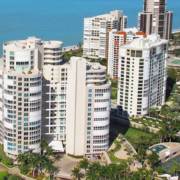Many condos want to install more storm protection after Irma. What are the options?
Now that Irma has come and gone and most of the dry out and cleanup has occurred, we are getting many questions from condominium association directors and officers asking how can they button up their windows, doors and sliders in the future to better avoid damage next time a hurricane may come our way.
Under Sections 718.113(5) and 718.115(e), Florida Statutes, if the maintenance, repair and replacement of hurricane shutters, impact glass, code-compliant windows or doors, or other types of code-compliant hurricane protection is the responsibility of the association in the Declaration of Condominium, the association may install such hurricane protection and assess all owners the cost thereof as a common expense.
If the maintenance, repair and replacement of such hurricane protection is the ‘Owner’ in the Declaration, then if the association obtains a majority vote of the voting interests, it can install the hurricane protection and charge individually to the unit owners based upon the cost of installation of the hurricane protection appurtenant to the unit.
In most declarations, hurricane protection is not discussed, but windows and doors are usually the maintenance, repair and replacement responsibility of the owners. If the whole building had hurricane shutters installed initially when developed, then usually the maintenance, repair and replacement of them is the association. Otherwise, usually some of the owner installed hurricane shutters on their windows and lanai as an alteration making them responsible for such shutters maintenance, repair and replacement.
If the board does not want to be in charge of installing the hurricane protection, but would rather leave it up to the individual owners to install the protection at their units but still wants to make sure everyone installs the protection, it can try to get a membership vote to amend the Declaration of Condominium to require the owners to install the protection by a certain date.
Most engineers and professionals in the hurricane protection industry will agree that the best way to protect the building from hurricane force winds and rain is to have all unit and common areas windows, sliders and door openings to the building protected. If just one window or door is broken or breached, the wind and rain can get in and cause much damage throughout the building. So, if you are looking for real protection, a plan should include installing hurricane protection on all potential openings in the building.
You may also find, that once hurricane protection has been installed in the entire building, you may get a break or credit in the association’s building insurance as well as maybe individual unit owner insurance.

